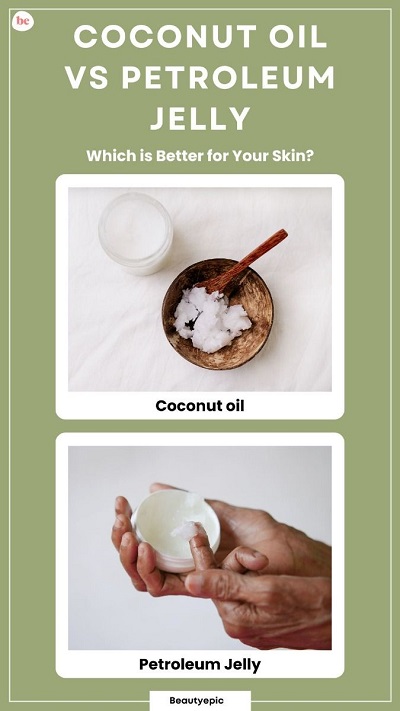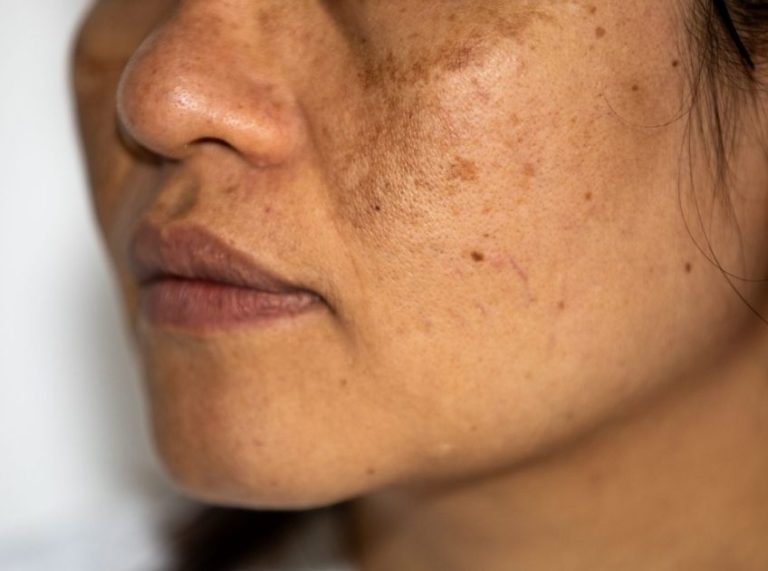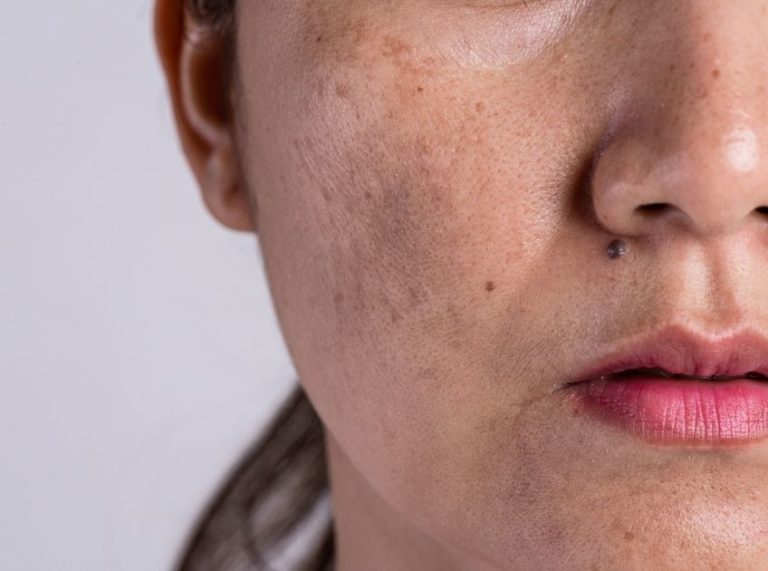
Important: This article is for informational purposes only. Please read our full disclaimer for more details.
Coconut oil and petroleum jelly are the two ingredients that are used worldwide for skincare. Both come with their own set of pros and cons. While coconut oil is a natural miracle for dry skin and hair, petroleum jelly is equally beneficial to keep skin soft and supple. However, their source, composition, and function are entirely different.
Article Contains
People with dry skin and chapped lips often get confused about what to use for maximum benefits. In this article, we will compare coconut oil vs petroleum jelly to help you understand what will work for your skin type and concern.
Keep reading!
Coconut Oil
Extracted from the coconut meat or kernel, coconut oil (1) is a non-fragrant product, rich in linoleic and lauric acid. These fatty acids in the oil bring all the good properties in it, making it suitable for all skin types. It is beneficial for skin, hair as well as cooking.
Due to its properties, it won’t be an exaggeration to say that coconut oil is nothing less than nature’s miracle. At the same time, it is rich in vitamins and minerals that help skin rejuvenate and radiate. Additionally, rarely people experience any side-effects of using coconut oil.
Benefits
- Moisturizes the skin naturally
- Reduces water loss from skin
- Strengthens skin barrier
- Improves skin elasticity
- Protects against microbes due to its antimicrobial properties
- Reduces acne due to its antibacterial properties
- Protects skin from environmental toxins, dirt, and other environmental pollutants
Petroleum Jelly
Petroleum jelly (2) is the by-product of petroleum, which is a crude oil. It has a gel-like consistency and is often used on hands and lips to keep them soft. However, being a by-product of oil refinement, it is not an environmentally-friendly product.
While coconut oil can be consumed, and people use it to prepare food, petroleum jelly is only used topically over the skin. It can prevent dehydration by creating a thick layer over the skin, thus preventing trans-evaporation.
Benefits
- Relieves dry and flaky skin
- It can be applied on chapped lips
- Improves diaper rash
- Prevents scab formation and thus protects from minor wounds
- Seals the skin’s moisture and protects from environmental pollutants
Below is the table differentiating coconut oil and petroleum jelly under different heads for better understanding-
While coconut oil is a natural moisturizer that keeps the skin nourished and hydrated, petroleum jelly is not a moisturizer. In fact, it serves as a barrier and prevents moisture from escaping the skin.
Coconut oil vs petroleum jelly- Side Effects
Coconut oil usually does not cause any side effects, but using it in moderation is advised. Applying coconut oil in excess may clog the pores, leading to acne breakouts. Also, if you already have oily skin, use very little coconut oil for your face. In fact, you may try it alternately to ensure it won’t cause acne.
On the contrary, petroleum jelly may have certain adverse effects, such as clogged pores that may lead to acne breakouts. Since it has a thick and gel-like consistency, it may feel heavy on the skin. So, even people with normal skin may feel greasy after applying petroleum jelly.
While you can apply coconut oil on the face, petroleum jelly is suitable for other body parts like hands, arms, and legs. It can be used on chapped lips to prevent moisture loss and keep them hydrated. Those with sensitive or acne-prone skin should never use petroleum jelly as it may cause more harm than help.
Conclusion
Comparing coconut oil vs petroleum jelly tells that both are beneficial for dry skin; however, their mode of function is entirely different. While petroleum jelly seals the moisture by creating a barrier to prevent water transpiration, coconut oil penetrates into the skin and hydrates it. Also, while petroleum jelly is greasy and feels sticky on skin, coconut oil absorbs into the skin easily and doesn’t feel that tacky.
Since both these products function differently and have certain side-effects, it is recommended to use them with caution. If you have any skin concerns, it is better to consult a dermatologist before using any of them.
Image Source : canva
Related Articles
- CeraVe Moisturizing Cream Vs. Lotion: What’s The Difference?
- CeraVe Healing Ointment Vs Aquaphor: Which Is Best?
- CeraVe Vs Eucerin – Which Is The Best For Your Skin?
- A+D Original Diaper Rash Ointment Prevents & Protects Diaper Rash on All Skin Types
- Body Lotion vs Body Cream: Understanding the Difference
- Does Aquaphor Clog Pores on Face?
- 12 Benefits and Uses of Petroleum Jelly For Your Skin & Hair
- Vaseline Original Petroleum Jelly: Skin Savior for All
- 50 Proven Uses & Benefits of Coconut Oil for Health and Beauty
- How to Use Coconut oil for Dry Hair Treatment?
- Difference Between Coconut Oil And Coconut Butter
- How to Use Coconut Oil for Hair? Benefits, Uses and Hair Masks
- Coconut Oil for Skin Whitening (Lightening): Does it Work?
- How to Use Coconut Oil for Dark Circles Under Eyes?
- How to Use Coconut oil and Baking Soda for Cellulite?
- What to Mix with Coconut Oil for Hair Growth
- Which Better Castor Oil or Coconut Oil for Hair Growth?
- 7 Best Coconut Oils For Healthy And Nourished Hair
- How to Use Coconut Oil for Skin Tightening?
















